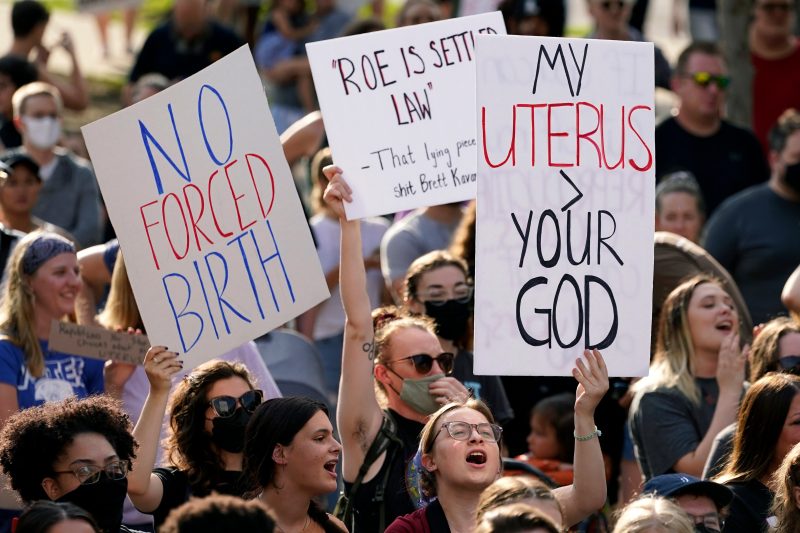Iowa’s GOP-controlled legislature is convening for a special session on abortion Tuesday — and Republicans are racing to pass by the end of the day a law banning most abortions at roughly six weeks.
Gov. Kim Reynolds (R) initiated the legislative sprint last week, calling state lawmakers back for a rare special session for the “sole purpose” of enacting new restrictions on abortion. The reason is clear: Last month, the state Supreme Court deadlocked on whether to reinstate a similar 2018 law, effectively preventing the ban from taking effect.
If GOP lawmakers pass a new ban, the move would significantly narrow the window for legal abortions in the state, where abortions are allowed until 22 weeks of pregnancy.
Republicans are planning to vote on legislation to ban most abortions after fetal cardiac activity has been detected, often around six weeks into a pregnancy. The bill says a provider must perform an abdominal ultrasound on a patient, and if “a fetal heartbeat” is detected, an abortion is prohibited.
The measure includes a few exceptions, such as for rape and incest, provided that the cases are reported to law enforcement. It also includes exceptions for fetal abnormalities that are “incompatible with life” and for medical emergencies in which the woman faces death or serious harm to her health.
Where is abortion legal and illegal?
End of carousel
Abortion rights advocates are vowing to fight the measure. Planned Parenthood Advocates of Iowa has planned a rally in the Capitol Rotunda for midday and is encouraging abortion supporters to speak out against the ban.
On the other side, antiabortion groups say they’re hopeful the Republican-dominated legislature will quickly pass the new restrictions — and that the courts will allow the ban to stand.
The language is almost identical and includes exceptions similar to those in the bill passed in 2018.
There are some small changes. One is a wording change in the section that describes the exceptions to the ban. The 2018 bill used the word “medically necessary” to describe some of the exemptions. But the 2023 bill describes them as “fetal heartbeat exceptions.”
The other difference is the speed at which the ban would be implemented: In 2018, the legislature passed the ban in May, and it was to go into effect on July 1, giving the Iowa Board of Medicine some time to spell out specific rules for how the ban would be enforced. This time, the legislation would go into effect as soon as the governor signs it.
They see an opening, and here’s why. A state judge ruled the 2018 ban unconstitutional — and the state did not challenge that ruling. But after the Supreme Court overturned Roe v. Wade last year, Reynolds asked a district court to reinstate the law. After the district court declined to do so, the governor appealed to the Iowa Supreme Court — and last month it issued a 3-to-3 decision on the matter, which meant the law could not go into effect.
So Republicans view that decision as a procedural move, and they’re hoping that by passing a new ban in the post-Roe era they’ll be able to ban abortions very early in pregnancy.
Peter McRoberts, the policy director for the American Civil Liberties Union of Iowa, which strongly opposes the legislation, said he was surprised and disappointed to see that Republicans did not expand the number of exceptions to their ban beyond what they allowed in the 2018 version.
“What I don’t understand is in the year since Dobbs [v. Jackson Women’s Health Organization], why didn’t they look at what they’ve learned since then?” he said, alluding to news reports of women being denied abortions despite experiencing severe medical complications.
Reynolds convened a special session that started Tuesday morning with committee hearings in both the House and Senate. Both chambers are then slated to debate identical versions of the bills in the afternoon and into the evening.
Activists on both sides of the aisle say they expect final passage of the legislation by midnight Eastern time, which is when debate on the measure is supposed to end. To move speedily through the process, lawmakers are expected to waive procedural rules, including a requirement for bills to be made public for a certain length of time before they’re voted on.
Immediately after the Supreme Court overturned Roe, a wave of bans in conservative states kicked in. In others, injunctions were quickly lifted on bills deemed unenforceable before the nation’s highest court overturned the constitutional right to an abortion.
But that wasn’t the case in Iowa.
Its 2018 ban hasn’t gone into effect, to the frustration of Republicans and antiabortion advocates. That has meant abortion has remained legal up until 22 weeks of pregnancy.
However, the rate of abortions in the state has declined slightly on average since before the June 2022 ruling, according to data from the Society of Family Planning, which supports abortion rights.
Mazie Stilwell, the director of public affairs at Planned Parenthood Advocates of Iowa, attributed this dynamic to the “uncertainty and fear” created by the nation’s new patchwork of abortion laws. She said more patients have headed to Minnesota, for instance, which moved to shore up access to the procedure in the past year.
A few years ago, multiple conservative-leaning states — including Georgia, Kentucky, Louisiana, Mississippi and Ohio — passed abortion bans for after fetal cardiac activity has been detected. However, some of those states had restrictions earlier in pregnancy that were designed to take effect if the Supreme Court overturned Roe.
Georgia has a similar ban, but such limits have been blocked by the courts in states including South Carolina and Ohio. Governor of Florida and GOP presidential hopeful Ron DeSantis signed a law this year banning most abortions after six weeks, touting it as a sign of his conservative bona fides, but it won’t take effect unless the state’s conservative-leaning Supreme Court approves Florida’s existing 15-week ban.
Some antiabortion advocates view such limits as a step toward banning nearly all abortions.
“While this is a good first step in moving forward, we’re going to continue our work and our advocacy to protect all human life,” said Maggie DeWitte, the executive director of Pulse Life Advocates, an antiabortion group in Iowa.



























